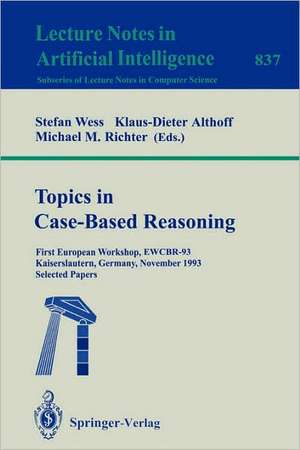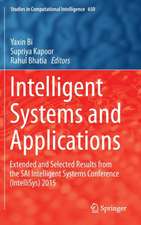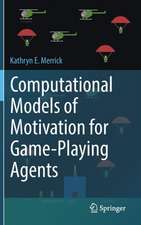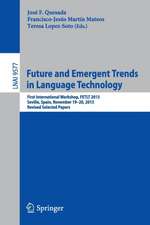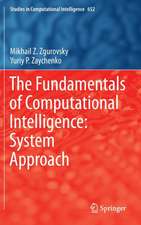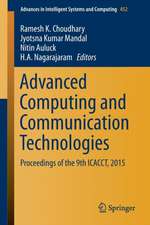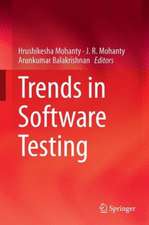Topics in Case-Based Reasoning: First European Workshop, EWCBR-93, Kaiserslautern, Germany, November 1-5, 1993. Selected Papers: Lecture Notes in Computer Science, cartea 837
Editat de Stefan Wess, Klaus-Dieter Althoff, Michael Richteren Limba Engleză Paperback – 26 aug 1994
Case-based reasoning (CBR) has recently attracted much interest among AI researchers: it supports knowledge acquisition and problem solving, and it is related to machine learning, analogical reasoning, cognitive modeling, similarity, and information retrieval. EWCBR is now established as the prime European forum for CBR research. This volume reflects the importance of this dynamic area of research through essential contributions to all aspects of CBR research and advanced applications.
Din seria Lecture Notes in Computer Science
- 20%
 Preț: 1061.55 lei
Preț: 1061.55 lei - 20%
 Preț: 307.71 lei
Preț: 307.71 lei - 20%
 Preț: 438.69 lei
Preț: 438.69 lei - 20%
 Preț: 579.30 lei
Preț: 579.30 lei -
 Preț: 410.88 lei
Preț: 410.88 lei - 17%
 Preț: 427.22 lei
Preț: 427.22 lei - 20%
 Preț: 596.46 lei
Preț: 596.46 lei - 15%
 Preț: 448.04 lei
Preț: 448.04 lei - 20%
 Preț: 353.50 lei
Preț: 353.50 lei -
 Preț: 389.49 lei
Preț: 389.49 lei - 20%
 Preț: 309.90 lei
Preț: 309.90 lei - 20%
 Preț: 645.28 lei
Preț: 645.28 lei - 20%
 Preț: 763.23 lei
Preț: 763.23 lei - 15%
 Preț: 580.46 lei
Preț: 580.46 lei - 20%
 Preț: 310.28 lei
Preț: 310.28 lei - 20%
 Preț: 655.02 lei
Preț: 655.02 lei - 20%
 Preț: 1183.14 lei
Preț: 1183.14 lei - 20%
 Preț: 340.32 lei
Preț: 340.32 lei -
 Preț: 449.57 lei
Preț: 449.57 lei - 20%
 Preț: 591.51 lei
Preț: 591.51 lei - 18%
 Preț: 938.83 lei
Preț: 938.83 lei - 20%
 Preț: 337.00 lei
Preț: 337.00 lei - 20%
 Preț: 649.50 lei
Preț: 649.50 lei - 20%
 Preț: 607.40 lei
Preț: 607.40 lei - 20%
 Preț: 1414.79 lei
Preț: 1414.79 lei - 20%
 Preț: 1024.44 lei
Preț: 1024.44 lei - 20%
 Preț: 583.40 lei
Preț: 583.40 lei - 20%
 Preț: 453.32 lei
Preț: 453.32 lei - 20%
 Preț: 575.49 lei
Preț: 575.49 lei - 20%
 Preț: 1075.26 lei
Preț: 1075.26 lei - 20%
 Preț: 585.88 lei
Preț: 585.88 lei - 20%
 Preț: 825.93 lei
Preț: 825.93 lei - 17%
 Preț: 360.20 lei
Preț: 360.20 lei - 20%
 Preț: 763.23 lei
Preț: 763.23 lei - 20%
 Preț: 340.32 lei
Preț: 340.32 lei - 20%
 Preț: 504.58 lei
Preț: 504.58 lei - 20%
 Preț: 369.13 lei
Preț: 369.13 lei - 20%
 Preț: 580.93 lei
Preț: 580.93 lei - 20%
 Preț: 343.62 lei
Preț: 343.62 lei - 20%
 Preț: 350.21 lei
Preț: 350.21 lei - 20%
 Preț: 583.40 lei
Preț: 583.40 lei - 20%
 Preț: 583.40 lei
Preț: 583.40 lei - 15%
 Preț: 438.59 lei
Preț: 438.59 lei - 20%
 Preț: 341.95 lei
Preț: 341.95 lei - 20%
 Preț: 238.01 lei
Preț: 238.01 lei - 20%
 Preț: 538.30 lei
Preț: 538.30 lei
Preț: 341.81 lei
Preț vechi: 427.26 lei
-20% Nou
Puncte Express: 513
Preț estimativ în valută:
65.41€ • 68.04$ • 54.00£
65.41€ • 68.04$ • 54.00£
Carte tipărită la comandă
Livrare economică 14-28 aprilie
Preluare comenzi: 021 569.72.76
Specificații
ISBN-13: 9783540583301
ISBN-10: 3540583300
Pagini: 488
Ilustrații: XIX, 476 p.
Dimensiuni: 155 x 235 x 26 mm
Greutate: 0.68 kg
Ediția:1994
Editura: Springer Berlin, Heidelberg
Colecția Springer
Seriile Lecture Notes in Computer Science, Lecture Notes in Artificial Intelligence
Locul publicării:Berlin, Heidelberg, Germany
ISBN-10: 3540583300
Pagini: 488
Ilustrații: XIX, 476 p.
Dimensiuni: 155 x 235 x 26 mm
Greutate: 0.68 kg
Ediția:1994
Editura: Springer Berlin, Heidelberg
Colecția Springer
Seriile Lecture Notes in Computer Science, Lecture Notes in Artificial Intelligence
Locul publicării:Berlin, Heidelberg, Germany
Public țintă
ResearchCuprins
Understanding creativity: A case-based approach.- Analogical asides on case-based reasoning.- PRODILOGY/ANALOGY: Analogical reasoning in general problem solving.- A knowledge level model of knowledge-based reasoning.- Learning prediction of time series. A theoretical and empirical comparison of CBR with some other approaches.- Case-based and symbolic classification.- A Similarity metric for retrieval of cases imperfectly explained.- Similarity measures for structured representations.- A rule-based similarity measure.- An underlying memory model to support case retrieval.- Massively parallel case-based reasoning with probabilistic similarity metrics.- Similarity evaluation between observed behaviours for the prediction of processes.- Using k-d trees to improve the retrieval step in case-based reasoning.- Explanation-based similarity: A unifying approach for integrating domain knowledge into case-based reasoning for diagnosis and planning tasks.- Structural similarity as guidance in case-based design.- Retrieving adaptable cases.- Adaptation through interpolation for time-critical case-based reasoning.- Knowledge engineering requirements in derivational analogy.- Incorporating (Re)-interpretation in case-based reasoning.- PBL: Prototype-based learning algorithm.- Explanation-driven case-based reasoning.- A reflective architecture for integrated memory-based learning and reasoning.- A hybrid knowledge-based system for technical diagnosis learning and assistance.- Tuning rules by cases.- Using case-based reasoning to focus model-based diagnostic problem solving.- A logical representation for relevance criteria.- Multiple explanation patterns.- The application of case-based reasoning to the tasks of health care planning.- A priori selection of mesh densities for adaptive finite element analysis, using a case-based reasoning approach.- Integrating semantic structure and technical documentation in case-based service support Systems.- Case-based information retrieval.- Case-based reasoning for network management.- Case-based reasoning in a simulation environment for biological neural networks.- Integrated case-based building design.- Case-deliverer: Making cases relevant to the task at hand.- A first study on case-based planning in organic synthesis.
